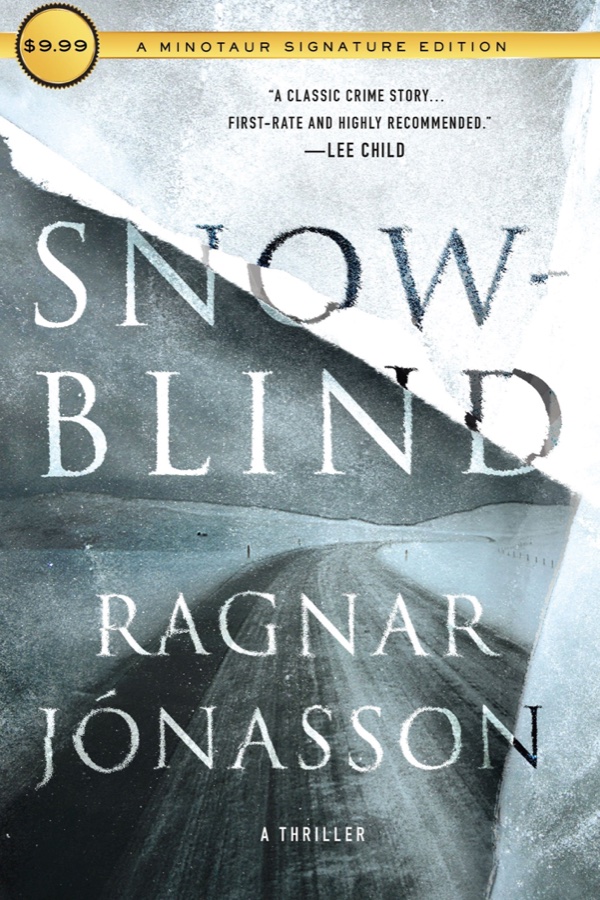Snowblind, written by Ragnar Jónasson and translated into English by Quentin Bates, is a well-written and fairly engrossing murder mystery set in Iceland. It is the first of the five book Dark Iceland series, which follows the career of young policeman Ari Thór Arason.
Set in modern day Iceland, the book opens in Reykjavik, Iceland, where a twenty-four year old Ari Thór is finishing up his education for a police career. Ari Thór is a likable character, but one with a certain lack of direction. His girlfriend, however, is goal-oriented, and is clearly thinking of a life-long commitment. Since the story is set during the recent economic trouble in Iceland, Ari Thór is concerned about the prospects of finding a job. Although happy with his girlfriend, he is still more driven by a desire to finish something for once, and he accepts a job on the police force of an isolated northern town, Siglufjörður. Siglufjörður is a fishing town that long ago ran out of fish, a place where nothing ever happens, and people don’t bother to lock their doors.
Naturally, it doesn’t stay that way. Soon Ari Thór must navigate the complexities of investigating a death that may or may not be murder, in a town where the locals view him with suspicion. Jónasson believably renders the rookie’s growing pains, as well as the tension he still feels with respect to the status of his relationship with Kristin, the woman he left in Reykjavik.
Jónasson effectively uses the stark, isolated landscape itself to emphasize the isolation Ari Thor feels locked away from his old life and caught in an investigation from which he cannot get much respite. The landscape is only one of the elements that give the book its distinctively Icelandic flavor. The book also has several major characters who are writers and playwrights, which is very appropriate considering that an amazing ten percent of Icelanders will be published writers at some point in their lives.
Interestingly, Jonasson injects a slightly theological flavor into the story. Ari Thór has an unfinished theology degree, which earns him the nickname “The Reverend” (to his irritation.) Ari Thór is not sure what he believes, but questions about God, good, and evil, lurk at the edges of the story in little details that at least raise the reader’s mind to consider the ultimate significance of life, death, innocence, and guilt.
Overall, the tale is well-told. Jónasson does a good job of balancing his preoccupation with each character’s deep back-story, and the need to keep the plot moving. In this way the book manages to be fairly reflective and literary, while still remaining a page-turning mystery. Readers who, like me, were reminded of Agatha Christie, will not be surprised to learn that Jónasson started his writing career only after spending years translating Christie’s works into Icelandic. He attributes his own writing career to studying her work, and emulating it. The results are very pleasing.
Readers should be aware that Snowblind contains a few mature or problematic elements. Ari Thór briefly has a live-in girlfriend, there are several non-graphic allusions to sexual behavior, a small amount of suggestive language, an allusion to abusive behavior, an affair (although this is portrayed in a negative light), and some language. On the whole the book has many positive elements, the negative elements are few and far between, and often they’re portrayed as disordered. Readers of the requisite age and maturity should be able to enjoy the book, and should not find it difficult to skip or properly frame problematic elements. Comparatively speaking, the book is far cleaner than much of what graces contemporary best-seller lists. With these considerations in mind, Snowblind merits a qualified recommendation for readers 17 and above.
Discussion Questions
- Ari Thór leaves for Siglufjörður, even though he genuinely cares about Kristin. Why?
- What are some of the mistakes Ari Thór makes, and what does he learn from them?
- What do you suppose is the author’s purpose in dropping in “God-talk”, without engaging in serious discussion about it, and without the characters arriving at any theological conclusions? What is the function of such language in the story?



